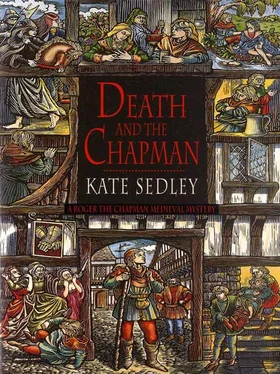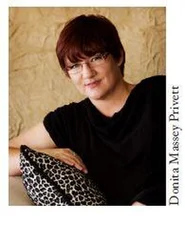Kate Sedley - Death and the Chapman
Здесь есть возможность читать онлайн «Kate Sedley - Death and the Chapman» весь текст электронной книги совершенно бесплатно (целиком полную версию без сокращений). В некоторых случаях можно слушать аудио, скачать через торрент в формате fb2 и присутствует краткое содержание. Жанр: Исторический детектив, на английском языке. Описание произведения, (предисловие) а так же отзывы посетителей доступны на портале библиотеки ЛибКат.
- Название:Death and the Chapman
- Автор:
- Жанр:
- Год:неизвестен
- ISBN:нет данных
- Рейтинг книги:4 / 5. Голосов: 1
-
Избранное:Добавить в избранное
- Отзывы:
-
Ваша оценка:
- 80
- 1
- 2
- 3
- 4
- 5
Death and the Chapman: краткое содержание, описание и аннотация
Предлагаем к чтению аннотацию, описание, краткое содержание или предисловие (зависит от того, что написал сам автор книги «Death and the Chapman»). Если вы не нашли необходимую информацию о книге — напишите в комментариях, мы постараемся отыскать её.
Death and the Chapman — читать онлайн бесплатно полную книгу (весь текст) целиком
Ниже представлен текст книги, разбитый по страницам. Система сохранения места последней прочитанной страницы, позволяет с удобством читать онлайн бесплатно книгу «Death and the Chapman», без необходимости каждый раз заново искать на чём Вы остановились. Поставьте закладку, и сможете в любой момент перейти на страницу, на которой закончили чтение.
Интервал:
Закладка:
I shook my head, trying to work up a lather with the coarse grey soap. ‘I’ve never been outside this country.’
‘I’ve been,’ the man informed me in the same quiet, rasping voice. ‘I was a soldier, I was, until I was wounded in a street fight. In the stomach, it was. I weren’t no good fer anythink after. But I was in the Low Countries fer a while afore that.’ The hooded eyes sparkled reminiscently. ‘If you’re ever in Bruges, cocky, go to the Waterhalle. Cor, what! I’ll tell you! Men and women can bathe together there. Naked as the day they were born! Just s’long as the woman wears a mask and don’t tell you ‘er name. And all with the blessing of the Duke of Burgundy, ‘imself, God love ‘im! I tell you, in this country we don’t know ‘ow to live.’
I laughed, but had no ready answer. London was as much as I could cope with at the moment, and tales of foreign countries beyond the English Channel only confused me further. When we were dry and dressed again, I invited my new friend to have dinner with me, judging by his clothes, which were even shabbier than mine, that a free meal would not come amiss. He accepted with alacrity and steered me in the direction of Fish Street, which ran north from London Bridge and where there were a couple of fine inns, the Bull and the King’s Head. My companion, whose name I had discovered to be Philip Lamprey — a nickname, on account of his partiality for that particular fish — chose the former.
‘Not so many of the gentry come in ‘ere as go to the King’s Head.’ He added lugubriously: ‘I’m not easy with the gentry. You can’t trust the buggers.’
But there were still a number of men in the Bull whose mode of dress and richness of apparel proclaimed them well-to-do merchants or burgesses at the very least. Lowborn creatures like us were directed to a smaller room where there was straw — and none too clean, at that — on the floor instead of rushes, and where the soup was served in wooden bowls rather than tin or pewter. And the pot-boy who brought our food and ale treated us with an ill-concealed contempt. His offhand manner told us plainly that he would rather be serving the gentry.
While we ate, I heard more of Philip Lamprey’s past. His wife had run away with a butcher and gone up north while he was soldiering abroad, taking their two sons with her. The rest of his family, parents and four sisters, were all dead, and his one remaining kinsman, a cousin, had died in the recent outbreak of plague. He made a living as best he could by begging, an occupation which some days rewarded him handsomely, but on others left him almost destitute. He was going through a bad patch at the moment, he told me: people were less charitable than they used to be, possibly because prices had rocketed during the late troubled times. But now that King Henry and his son were dead, Margaret of Anjou in custody, and good King Edward, the Londoners’ friend safely back on his throne again, things were bound to improve.
‘And when that ‘appens,’ he said, wiping the soup from his mouth with his sleeve, ‘I’ll buy you a dinner. ‘Ow long are you going’ t’ be in London? An’ where are you stayin’?’
‘I was hoping to find hospitality at the Baptist’s Head in Crooked Lane,’ I answered. ‘I was told to go there by a man I met in Bristol, who’s a friend of the landlord.’
‘Oh, I know it all right.’ Philip Lamprey drank the rest of his ale. ‘Off Thames Street. Crooked Lane, that is. The Baptist’s Head… Now, let me see… ‘ He stared musingly into the depths of his empty cup and, taking the hint, I yelled for the pot-boy to bring us more ale. ‘That’s the place on the left-hand side as you goes towards the river. Very close to the water, it is. If I remember aright, one lot o’ windows looks out over the Thames.’ He scratched his sparse greying hair. Flakes of dead skin fell and settled on the shoulders of his threadbare jacket. He picked some shreds of meat from between the stumps of his teeth. ‘Not a big place. Not so big as the inn higher up the street, on the corner, but it’s got a name fer selling very good wines. Not fer the likes of me and you, o’ course. Only fer those as can afford ‘em.’
The pot-boy reappeared and grudgingly refilled our wooden cups from the big stone jug that he was carrying.
‘This other inn you mentioned,’ I said, after I had taken several gulps of my ale. ‘Would that be called the Crossed Hands?’
My companion nodded, wheezing and gasping, having swallowed too much far too fast. ‘Tha’s it.’ He knuckledhis watering eyes and blew his nose in his fingers. ‘Much grander place ‘n the other. Shouldn’t advise you to go lookin’ fer a billet there.’
‘I have no intention of doing so,’ I told him drily, but my grim smile was of course wasted on Philip.
‘Tha’s all right then. They’d only turn you away if you did. The landlord don‘t encourage our sort, by what I hear.‘ ‘What else do you hear?’ I asked; then, seeing his look of puzzlement, added impatiently: ‘About the Crossed Hands inn.’
Philip Lamprey shrugged. ‘Not much. Nothink bad, at any rate. Landlord’s called Martin Trollope, but I don’t know nothink to ‘is deprimunt.’ He hesitated. ‘We-ell … I did over’ear someone say once as ‘ow ‘e was a greedy bastard. Willin’ to do anythink fer money. But then, oo wouldn’t?’
My heartbeat faster. This wasn’t evidence, but at least it added fuel to my speculations that there was something suspicious about the Crossed Hands inn. I asked: ‘Is Crooked Lane far from here?’
Philip gave his throaty chuckle. ‘Lor’ luv you, no! I’ll take you there, if you like, when we’ve finished drinkin’.’ I accepted his offer gratefully, but when we finally reached Thames Street I recognized it as one of the roads I had walked along that morning. It stretched from the Tower, through the fish markets of Billingsgate to the Bridge, and was one of the busiest streets in London, so blocked all day long with carts and drays that even the nobles and their retinues, leaving the royal apartments in the White Tower, were compelled to wait, fuming and bad-tempered, until the road was clear. The cursing and swearing which constantly assaulted the ears had to be heard to be believed.
Crooked Lane itself was off that part of Thames Street known, so Philip told me, as Petty Wales; a narrow alleyway into which little sunlight filtered because of the overhanging upper storeys of the houses on either side. And there, on the right-hand corner, its sign of two crossed mailed fists, creaking slightly in the breeze — not, I was relieved to note, as I had imagined it in my dream — stood the Crossed Hands inn.
Chapter 10
The sign creaked slightly, as though its hinges were rusty, and close beside it I noticed the iron bracket which at night would hold a torch, lighting up the name of the inn; the light which had also illuminated the face of Clement Weaver on the last occasion his sister had seen him.
The lower half of the building was made of stone, but the upper half had a timber frame, with walls of wooden lattice work and plaster. The downstairs windows, which looked out on to Thames Street, had old-fashioned shutters, but some of those above were of horn, or covered with sheets of oiled parchment. The entrance was through an archway in Crooked Lane, and the inn was built around a central courtyard. Looking through, I could see all the midday bustle of arrivals and departures, of pot-boys and serving-maids hurrying to and from the kitchens with the dirty plates and knives used at dinner. A horse, a big grey gelding, tethered to the bar beside the mounting-block, champed impatiently at the bit, awaiting his owner.
‘You ain’t goin’ in there?’ Philip Lamprey queried in my ear.
Читать дальшеИнтервал:
Закладка:
Похожие книги на «Death and the Chapman»
Представляем Вашему вниманию похожие книги на «Death and the Chapman» списком для выбора. Мы отобрали схожую по названию и смыслу литературу в надежде предоставить читателям больше вариантов отыскать новые, интересные, ещё непрочитанные произведения.
Обсуждение, отзывы о книге «Death and the Chapman» и просто собственные мнения читателей. Оставьте ваши комментарии, напишите, что Вы думаете о произведении, его смысле или главных героях. Укажите что конкретно понравилось, а что нет, и почему Вы так считаете.












